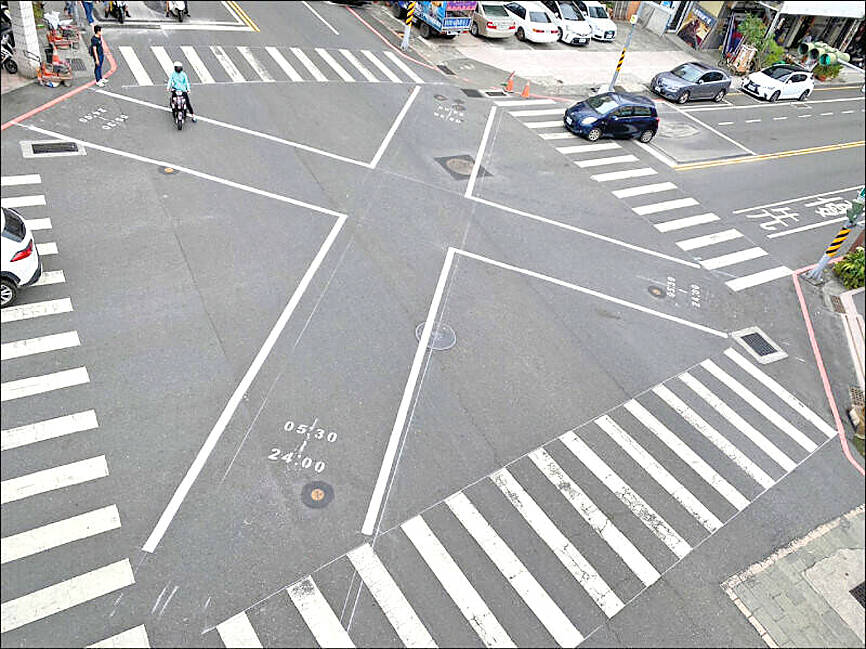The Ministry of the Interior has published a preview of the proposed enforcement rules for the Regulations on Pedestrian Traffic Safety Facilities (行人交通安全設施條例施行細則), which state that drivers who speed in areas designated as pedestrian priority zones can be fined up to NT$36,000.
The enforcement rules were drafted after the Legislative Yuan passed the regulations in April. The ministry on Thursday uploaded a preview of the enforcement rules on its Web site. They are open for public comment until Thursday next week.
The rules are scheduled to take effect on Oct. 1.

Photo courtesy of the Tainan Bureau of Transportation
The draft rules state that local governments should designate areas with high pedestrian density as pedestrian-friendly zones, including those around government agencies, schools, medical institutions, child and youth welfare organizations, after-school care service institutions, education and care service facilities, elderly-care facilities, public transport hubs, and markets and shopping areas.
Local governments must give 30 days’ notice and hold an information session before designating an area a pedestrian-friendly zone, the draft rules state.
Pedestrian priority zones, on the other hand, are those in which pedestrians have right of way. Motorists driving past pedestrian priority zones must slow down and must not threaten pedestrians’ safety or impede their access to the zone.
Drivers in pedestrian priority zones must completely stop their vehicle so that pedestrians can cross the street, but pedestrians must not block drivers’ access to the zones without legitimate reason, they state.
Local governments would be required to implement measures to ensure safety in pedestrian priority zones, such as having special signs and markings at intersections, installing speed bumps, using different colors or pavements to mark the beginning and end of the zone, and putting up signs to remind drivers to slow down, watch out for pedestrians and that they are banned from honking at pedestrians.
The speed limit would 30kph in pedestrian-friendly zones and 20kph in pedestrian priority zones.
Those driving 40kph or faster would be considered to be seriously speeding, ministry officials said.
Motorists exceeding the speed limit, but who have not reached 40kph would be fined NT$1,200 to NT$2,400 under the Road Traffic Management and Penalty Act (道路交通管理處罰條例), while those exceeding 40kph would be fined NT$6,000 to NT$36,000 and ordered to stop driving on the spot, the officials said.
Local governments would also be required to budget for installing sidewalks on roads that are 12m wide or more. Sidewalks would be optional if roads are less than 12m wide or have covered or uncovered walkways.
The rules would require local governments to locate roads without sidewalks, or those that are not wide enough or have obstacles. They would also have to identify locations where accidents frequently occur and areas with a high density of pedestrians.

Taiwan is projected to lose a working-age population of about 6.67 million people in two waves of retirement in the coming years, as the nation confronts accelerating demographic decline and a shortage of younger workers to take their place, the Ministry of the Interior said. Taiwan experienced its largest baby boom between 1958 and 1966, when the population grew by 3.78 million, followed by a second surge of 2.89 million between 1976 and 1982, ministry data showed. In 2023, the first of those baby boom generations — those born in the late 1950s and early 1960s — began to enter retirement, triggering

ECONOMIC BOOST: Should the more than 23 million people eligible for the NT$10,000 handouts spend them the same way as in 2023, GDP could rise 0.5 percent, an official said Universal cash handouts of NT$10,000 (US$330) are to be disbursed late next month at the earliest — including to permanent residents and foreign residents married to Taiwanese — pending legislative approval, the Ministry of Finance said yesterday. The Executive Yuan yesterday approved the Special Act for Strengthening Economic, Social and National Security Resilience in Response to International Circumstances (因應國際情勢強化經濟社會及民生國安韌性特別條例). The NT$550 billion special budget includes NT$236 billion for the cash handouts, plus an additional NT$20 billion set aside as reserve funds, expected to be used to support industries. Handouts might begin one month after the bill is promulgated and would be completed within

The National Development Council (NDC) yesterday unveiled details of new regulations that ease restrictions on foreigners working or living in Taiwan, as part of a bid to attract skilled workers from abroad. The regulations, which could go into effect in the first quarter of next year, stem from amendments to the Act for the Recruitment and Employment of Foreign Professionals (外國專業人才延攬及僱用法) passed by lawmakers on Aug. 29. Students categorized as “overseas compatriots” would be allowed to stay and work in Taiwan in the two years after their graduation without obtaining additional permits, doing away with the evaluation process that is currently required,

IMPORTANT BACKER: China seeks to expel US influence from the Indo-Pacific region and supplant Washington as the global leader, MAC Minister Chiu Chui-cheng said China is preparing for war to seize Taiwan, Mainland Affairs Council (MAC) Minister Chiu Chui-cheng (邱垂正) said in Washington on Friday, warning that Taiwan’s fall would trigger a regional “domino effect” endangering US security. In a speech titled “Maintaining the Peaceful and Stable Status Quo Across the Taiwan Strait is in Line with the Shared Interests of Taiwan and the United States,” Chiu said Taiwan’s strategic importance is “closely tied” to US interests. Geopolitically, Taiwan sits in a “core position” in the first island chain — an arc stretching from Japan, through Taiwan and the Philippines, to Borneo, which is shared by